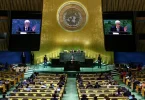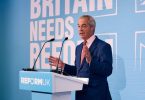Yossi Mekelberg
In a world where threats and dangers are plentiful, diverse and appear to creep from almost every corner, the findings of a recent survey by the Pew Research Center, which discovered that adults across 25 countries see the spread of false information online as the top threat, seems unexpected, at least at first glance. Why would people feel more threatened by false information than, for instance, the condition of the global economy, terrorism, climate change or the spread of infectious diseases, as this survey reveals?
It is not that people are complacent about the other threats, with the respondents’ other concerns not lagging far behind. Yet, so soon after the world came to a halt due to the worst pandemic in living memory; after repeated warnings that unless humanity takes drastic measures to contain global warming we are all doomed; and the fact that most people feel poorer than they did a few years ago, the prominence of disinformation, or fake news, as existentially scary is not self-evident. At the end of the day, are we not knowledgeable enough to distinguish between truth and lies?
It is not that disinformation is new or unique to our generation, but it might be the magnitude and the frequency of it today and the fact that those who spread it do so bluntly and unashamedly that terrifies us. It is also because, broadly speaking, people are more educated than in the past and so are aware of the dangers of spreading misinformation.
Disinformation is usually regarded as being created to appeal to emotions and exploit biases to influence public opinion. It takes a variety of forms, from complete fabrication of new content to manipulating existing content, impersonating trusted sources to enjoy unwarranted credibility, presenting information in a completely misleading context or creating spurious connections. The development of technological capabilities in terms of volume and speed of information, in addition to a multitude of platforms and the ability to hide one’s identity or location, has become a goldmine for those who spread disinformation. The perpetrators range from the relatively benign to fraudsters doing so for economic gain and foreign governments trying to influence public opinion in other countries, even through skewing election results.
Unlike the other threats suggested by this survey, misleading information — or sheer untruths — are something that we are constantly exposed to and, consequently, it is the countless sources of communication that make us generally distrustful. Every time we access a website, we are offered data cookies that we do not want, but by now we know that our actions on the internet are followed and might be used, for better or worse, to feed us with information, which in too many cases is inaccurate, if not completely fictitious. Hence, it is not surprising that 72 percent of adults across 25 nations say that the spread of false information online is a major threat to their country, while only 4 percent do not think of it as a threat at all.
Rating false information as the top threat to our societies does not diminish how people perceive other risks and dangers to our well-being, even our very survival, as is expressed in this survey, but it underlines the fact that we cannot successfully deal with all the other immense challenges unless we can trust information related to them. To a large extent, we are a product of the 18th-century Enlightenment, which was underpinned by dedication to reason and logic in the pursuit of knowledge. It is no surprise that the scientific age overlapped the Enlightenment and, until rather recently with the emergence of a new age of populism, operated on the premise that humanity’s existence and progress rely on integrity and reliable information that represents the best efforts of our current science to establish the truth.
The biggest challenges that we face do not have straightforward answers and, for suitable answers to emerge, critical thinking is required that first establishes what is true and what is false. The need to differentiate between facts and opinion, truth and lies, is fundamental to how we operate as human beings and the relations within a society. Knowing the truth is not a sufficient condition to keep our societies from falling apart, but it is without doubt a necessary one.
It is five years since we learned for the first time about COVID-19 and its horrendous consequences for our societies — and we are now warned by experts that the next pandemic is only a matter of time. The COVID-19 pandemic was a prime example of how we can benefit from reliable information and how harmful misinformation and disinformation can be, literally making the difference between life and death. There was a constant battle between the well-respected scientific community, with its decision-makers who worked responsibly with the information available in the face of a novel and deadly virus, and the flood of conspiracy theorists and irresponsible populist politicians who spread false information that confused the public, to its detriment.
Similarly, while the scientific evidence that climate change is indeed a genuine threat and is human-made is indisputable, it still does not stop those who completely deny it or “merely” dismiss the importance of its already catastrophic consequences from continuing to spread their false narrative. While the evidence of global warming stares us in the face, with mounting data to confirm it as well as our daily experiences of it, there are those who, for their own reasons, feed the public with distorted information that sews doubts about its existence and at the very least slows down our responses to this deadly challenge.
To make things worse, in the age of populism and social media — which seems to be a marriage made in hell — those who spread fake and unsubstantiated hypotheses as if they are the result of well-researched effort expect to be treated with the same respect as those who honor the integrity of scientific methods. Increasingly, they do so by either finding funding for creating legacy media outlets such as newspapers or radio and TV stations or misusing social media as they wish.
The value and benefits of adhering to the truth are important in any walk of life, whether in the relations between human beings or with nature, as they enable us to trust each other and our institutions. This is the glue that keeps us together, without which the very existence of our societies and their ability to prosper is put in jeopardy.
Courtesy: arabnews







